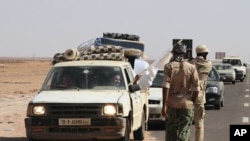A leading member of Niger’s ruling Party for Democracy and Socialism (PNDS-Tarayya) says the government is stepping up efforts to combat any security threat posed by a spillover of the conflict in neighboring Libya.
Sani Iro, the party’s communications director, said the administration has provided additional military equipment to the national army to protect unarmed civilians in the northern border region, Niger shares with Libya.
“Since the [new civilian] government took over, it has made sure that security is reinforced mainly in the northern part of the country. And that is why the first thing that was done was a visit by the defense minister to that area,” said Iro. “The government promised it will meet all the needs of the security forces there….”
Iro’s comments follow reports that residents in northern Niger are concerned that hundreds of Tuaregs from Libya are returning home with sophisticated weapons.
The Tuaregs are suspected of being part of the Libyan army and loyalists who fought for deposed Libyan leader Moammar Gadhafi.
Security experts warn the proliferation of arms could destabilize the region.
“The Niger army [seized] some vehicles coming from Libya with arms,” said Iro. “Just some weeks ago, the army [also] stopped more than 60 vehicles coming from Libya… This shows that the Nigerien army is trying and succeeding [in facing] this difficulty.”
He expressed confidence the military is capable of “stabilizing the region and tackling the challenge of security in the north of our country.”
Iro said Prime Minister Brigi Rafini is touring the border region, including the areas of Agadez and Diffa, to assure residents there of his administration’s determination to protect them from any aggression.
An estimated 211,000 Nigeriens have so far returned home after fleeing the conflict in Libya.
They have come home to food shortages, and to fragile economy.
Iro said the administration has a “true” challenge providing relief supplies.
“It’s a real problem with this [returning] population coming back from Libya. And it is a problem to receive these people and to try help them with food and water,” said Iro. “The government doesn’t have the means to give work to all these people, but what we try to do is to help them to go back to their villages, so that they can insert themselves in the local economy.”




